Roberts A.D. The Cambridge History of Africa, Volume 7: from 1905 to 1940
Подождите немного. Документ загружается.

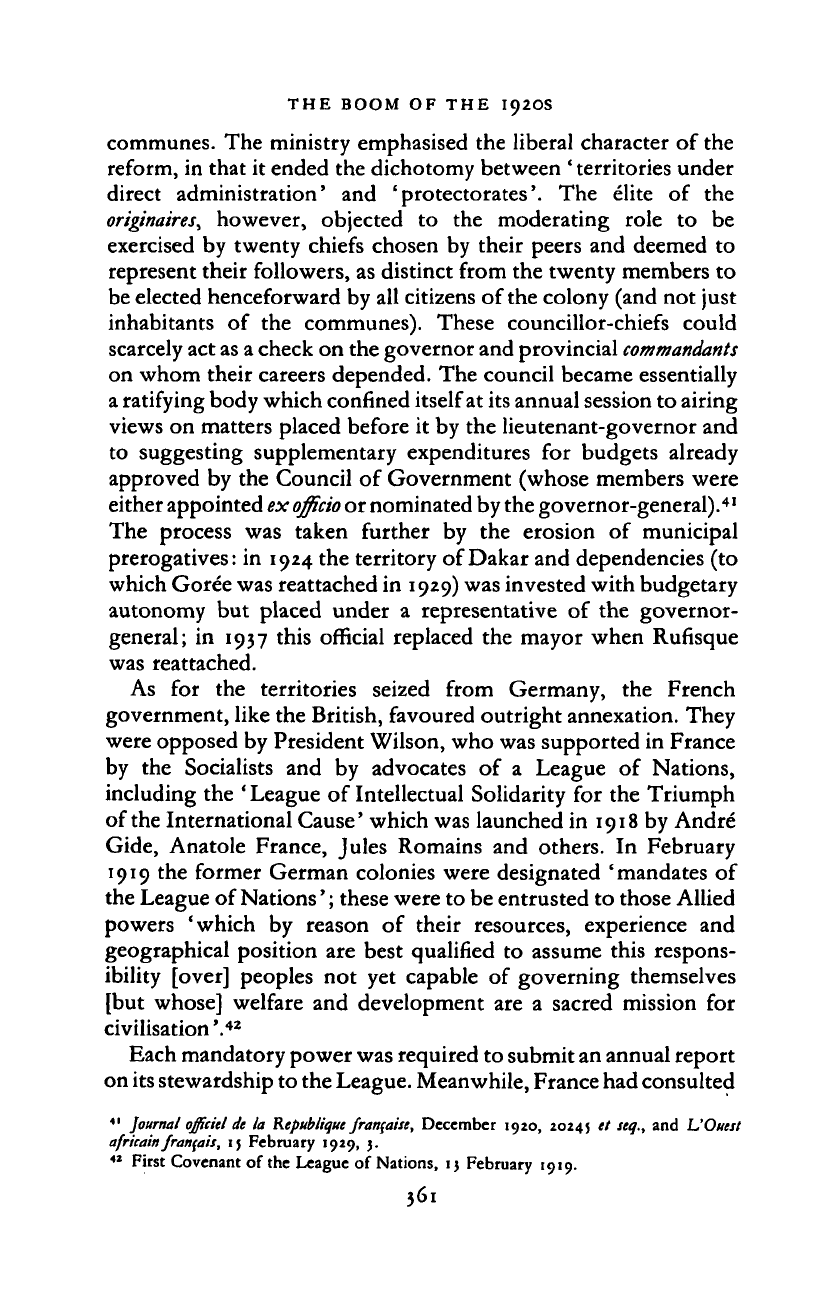
THE BOOM OF THE 1920S
communes. The ministry emphasised the liberal character of the
reform, in that it ended the dichotomy between ' territories under
direct administration' and 'protectorates'. The elite of the
originates, however, objected to the moderating role to be
exercised by twenty chiefs chosen by their peers and deemed to
represent their followers, as distinct from the twenty members to
be elected henceforward by all citizens of the colony (and not just
inhabitants of the communes). These councillor-chiefs could
scarcely act
as
a check on the governor and provincial
commandants
on whom their careers depended. The council became essentially
a ratifying body which confined itself at its annual session to airing
views on matters placed before it by the lieutenant-governor and
to suggesting supplementary expenditures for budgets already
approved by the Council of Government (whose members were
either appointed
exofficio
or nominated by the governor-general).
41
The process was taken further by the erosion of municipal
prerogatives: in 1924 the territory of Dakar and dependencies (to
which Goree was reattached in 1929) was invested with budgetary
autonomy but placed under a representative of the governor-
general; in 1937 this official replaced the mayor when Rufisque
was reattached.
As for the territories seized from Germany, the French
government, like the British, favoured outright annexation. They
were opposed by President Wilson, who was supported in France
by the Socialists and by advocates of a League of Nations,
including the ' League of Intellectual Solidarity for the Triumph
of
the
International Cause' which was launched in 1918 by Andre
Gide, Anatole France, Jules Romains and others. In February
1919 the former German colonies were designated 'mandates of
the League of Nations'; these were to be entrusted to those Allied
powers 'which by reason of their resources, experience and
geographical position are best qualified to assume this respons-
ibility [over] peoples not yet capable of governing themselves
[but whose] welfare and development are a sacred mission for
civilisation \
42
Each mandatory power was required to submit an annual report
on its stewardship to the
League.
Meanwhile, France had consulted
41
Journal officitl de
la
Kcpublique frattfaise, December 1920, 20245
et
se
1->
a
"d
L'Ouest
africain franfais,
IJ
February 1929,
3.
42
First Covenant
of
the League
of
Nations,
13
February 1919.
361
Cambridge Histories Online © Cambridge University Press, 2008
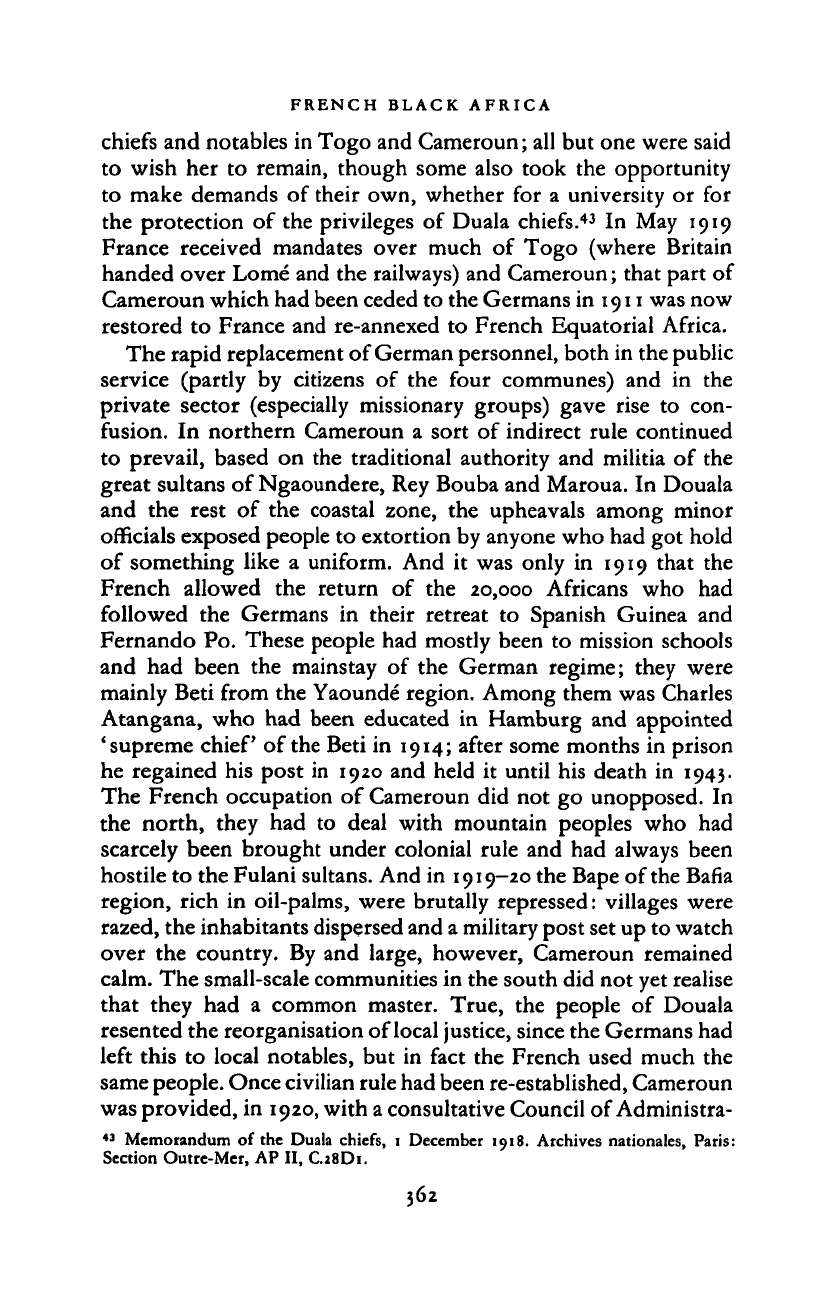
FRENCH BLACK AFRICA
chiefs
and
notables in Togo and Cameroun; all but one were said
to wish
her to
remain, though some also took
the
opportunity
to make demands
of
their own, whether
for a
university
or for
the protection
of the
privileges
of
Duala chiefs.
43
In May 1919
France received mandates over much
of
Togo (where Britain
handed over Lome and
the
railways)
and
Cameroun; that part
of
Cameroun which had been ceded to the Germans in 1911 was now
restored
to
France
and
re-annexed
to
French Equatorial Africa.
The rapid replacement of German personnel, both in the public
service (partly
by
citizens
of the
four communes)
and in the
private sector (especially missionary groups) gave rise
to con-
fusion.
In
northern Cameroun
a
sort
of
indirect rule continued
to prevail, based
on the
traditional authority
and
militia
of the
great sultans
of
Ngaoundere, Rey Bouba and Maroua.
In
Douala
and
the
rest
of the
coastal zone,
the
upheavals among minor
officials exposed people
to
extortion by anyone who had got hold
of something like
a
uniform.
And it was
only
in 1919
that
the
French allowed
the
return
of the
20,000 Africans
who had
followed
the
Germans
in
their retreat
to
Spanish Guinea
and
Fernando Po. These people
had
mostly been
to
mission schools
and
had
been
the
mainstay
of the
German regime; they were
mainly Beti from
the
Yaounde region. Among them was Charles
Atangana,
who had
been educated
in
Hamburg
and
appointed
'supreme chief
of
the Beti
in
1914; after some months
in
prison
he regained
his
post
in
1920
and
held
it
until
his
death
in 1943.
The French occupation
of
Cameroun
did not go
unopposed.
In
the north, they
had to
deal with mountain peoples
who had
scarcely been brought under colonial rule
and had
always been
hostile
to
the Fulani sultans. And in 1919-20 the Bape of the Bafia
region, rich
in
oil-palms, were brutally repressed: villages were
razed, the inhabitants dispersed and a military post set up to watch
over
the
country.
By and
large, however, Cameroun remained
calm. The small-scale communities
in
the south did not yet realise
that they
had a
common master. True,
the
people
of
Douala
resented the reorganisation of local justice, since the Germans had
left this
to
local notables,
but in
fact
the
French used much
the
same
people.
Once civilian rule had been re-established, Cameroun
was provided,
in
1920,
with a consultative Council of Administra-
43
Memorandum
of
the Duala chiefs,
1
December 1918. Archives nationales, Paris:
Section Outre-Mer,
AP II,
C.28D1.
362
Cambridge Histories Online © Cambridge University Press, 2008
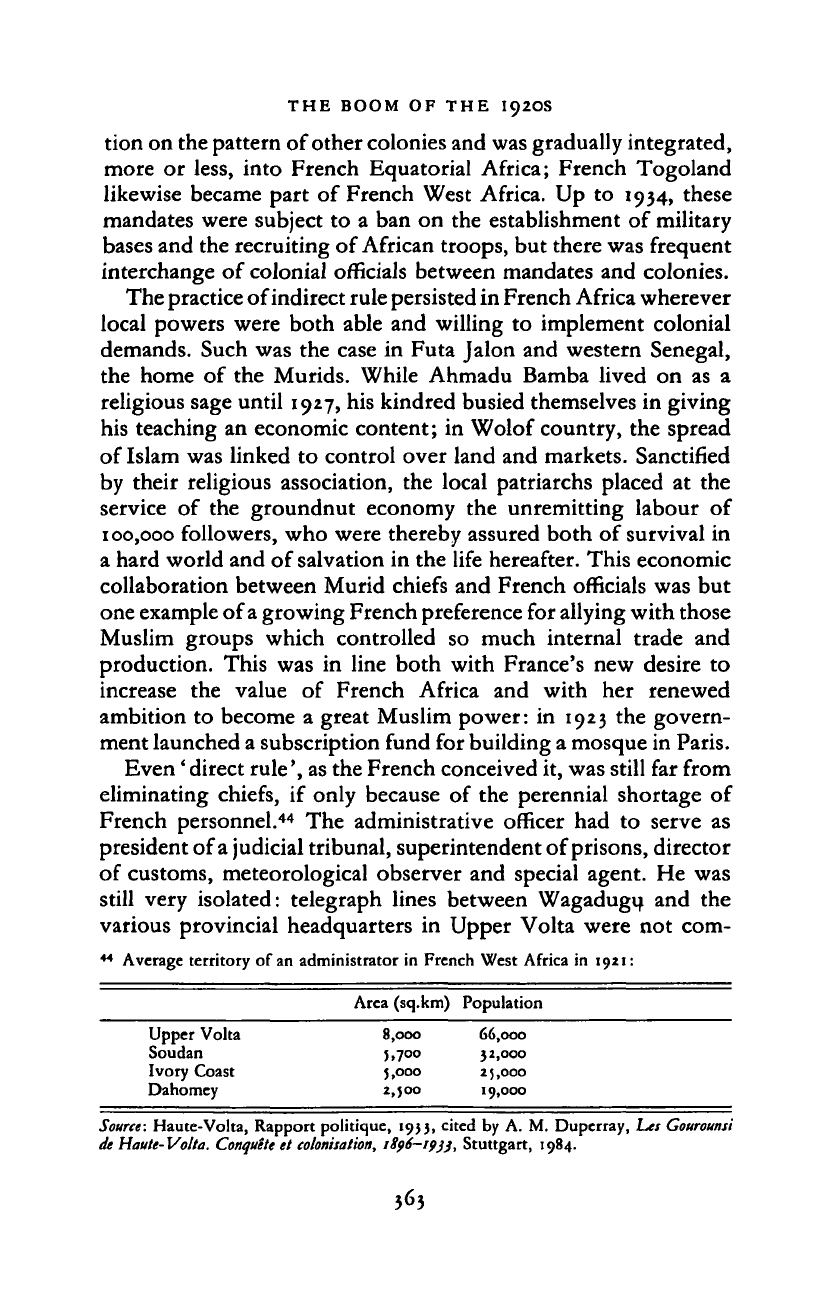
THE BOOM OF THE 1920S
tion on the pattern of other colonies and was gradually integrated,
more or less, into French Equatorial Africa; French Togoland
likewise became part of French West Africa. Up to 1934, these
mandates were subject to a ban on the establishment of military
bases and the recruiting of African troops, but there was frequent
interchange of colonial officials between mandates and colonies.
The practice of indirect rule persisted in French Africa wherever
local powers were both able and willing to implement colonial
demands. Such was the case in Futa Jalon and western Senegal,
the home of the Murids. While Ahmadu Bamba lived on as a
religious sage until 1927, his kindred busied themselves in giving
his teaching an economic content; in Wolof country, the spread
of Islam was linked to control over land and markets. Sanctified
by their religious association, the local patriarchs placed at the
service of the groundnut economy the unremitting labour of
100,000 followers, who were thereby assured both of survival in
a hard world and of salvation in the life hereafter. This economic
collaboration between Murid chiefs and French officials was but
one example of
a
growing French preference for allying with those
Muslim groups which controlled so much internal trade and
production. This was in line both with France's new desire to
increase the value of French Africa and with her renewed
ambition to become a great Muslim power: in 1923 the govern-
ment launched a subscription fund for building a mosque in Paris.
Even' direct rule', as the French conceived it, was still far from
eliminating chiefs, if only because of the perennial shortage of
French personnel.
44
The administrative officer had to serve as
president of a judicial tribunal, superintendent of prisons, director
of customs, meteorological observer and special agent. He was
still very isolated: telegraph lines between Wagadugu and the
various provincial headquarters in Upper Volta were not com-
44
Average territory of an administrator in French West Africa in 19*1:
Area (sq.km) Population
Upper Volta
Soudan
Ivory Coast
Dahomey
8,000
5,700
5,000
2,500
66,000
) 2,000
25,000
19,000
Source: Haute-Volta, Rapport politique, 1933, cited by A. M. Duperray, Let
Gourounsi
de Haute-Volta. Conquite et
colonisation,
1896-if)), Stuttgart, 1984.
Cambridge Histories Online © Cambridge University Press, 2008
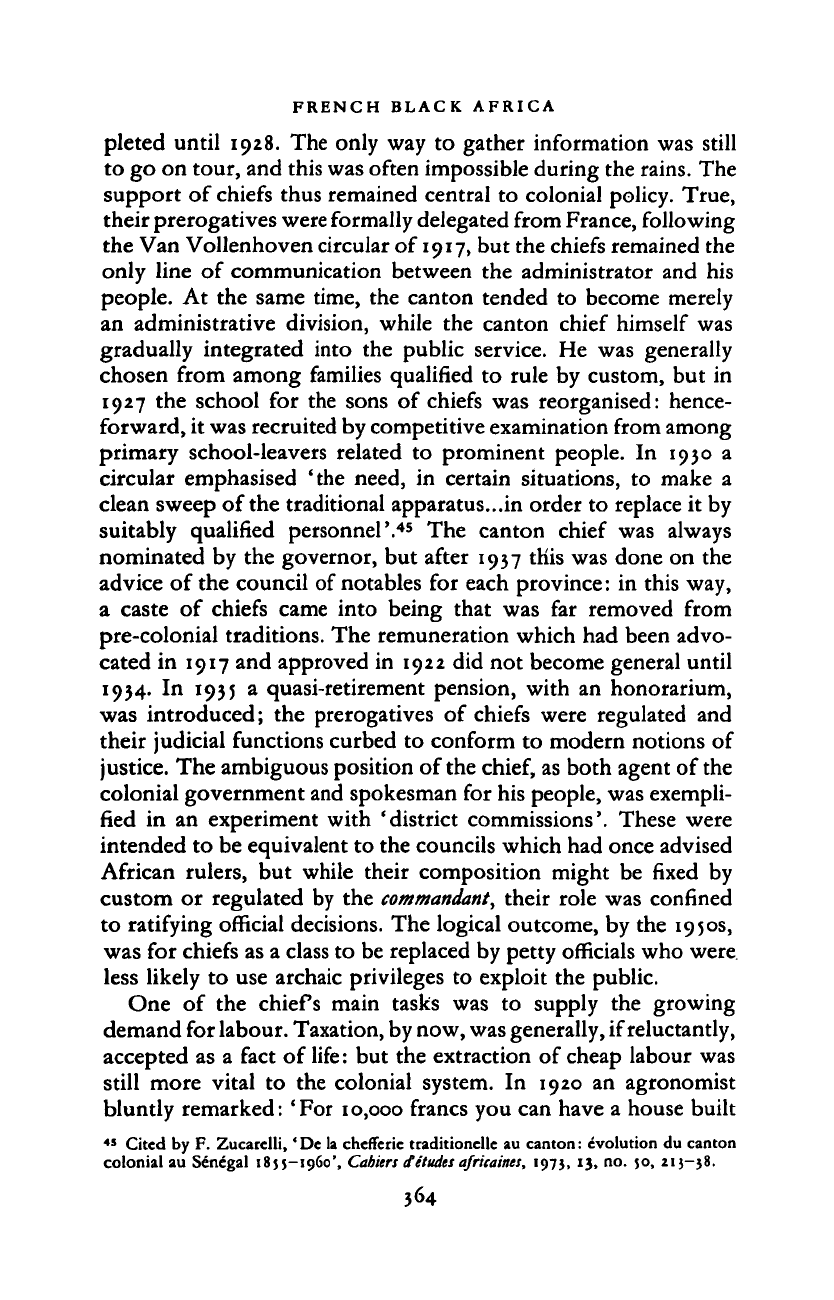
FRENCH BLACK AFRICA
pleted until 1928. The only way to gather information was still
to go on tour, and this was often impossible during the rains. The
support of chiefs thus remained central to colonial policy. True,
their prerogatives were formally delegated from France, following
the Van Vollenhoven circular of
1917,
but the chiefs remained the
only line of communication between the administrator and his
people. At the same time, the canton tended to become merely
an administrative division, while the canton chief himself was
gradually integrated into the public service. He was generally
chosen from among families qualified to rule by custom, but in
1927 the school for the sons of chiefs was reorganised: hence-
forward, it was recruited by competitive examination from among
primary school-leavers related to prominent people. In 1930 a
circular emphasised 'the need, in certain situations, to make a
clean sweep of the traditional apparatus...in order to replace it by
suitably qualified personnel'.
45
The canton chief was always
nominated by the governor, but after 1937 this was done on the
advice of the council of notables for each province: in this way,
a caste of chiefs came into being that was far removed from
pre-colonial traditions. The remuneration which had been advo-
cated in 1917 and approved in 1922 did not become general until
1934.
In 1935 a quasi-retirement pension, with an honorarium,
was introduced; the prerogatives of chiefs were regulated and
their judicial functions curbed to conform to modern notions of
justice. The ambiguous position of the
chief,
as both agent of the
colonial government and spokesman for his people, was exempli-
fied in an experiment with 'district commissions'. These were
intended to be equivalent to the councils which had once advised
African rulers, but while their composition might be fixed by
custom or regulated by the
commandant,
their role was confined
to ratifying official decisions. The logical outcome, by the 1950s,
was for chiefs as a class to be replaced by petty officials who were,
less likely to use archaic privileges to exploit the public.
One of the chiefs main tasks was to supply the growing
demand for labour. Taxation, by now, was generally, if reluctantly,
accepted as a fact of life: but the extraction of cheap labour was
still more vital to the colonial system. In 1920 an agronomist
bluntly remarked: 'For 10,000 francs you can have a house built
45
Cited by F. Zucarclli,' De la chefferie traditionelle au canton: evolution du canton
colonial au Senegal 185 5-1960', Cabiers ditudts afritaines, 1973, 13, no. 50, 213—}8.
364
Cambridge Histories Online © Cambridge University Press, 2008
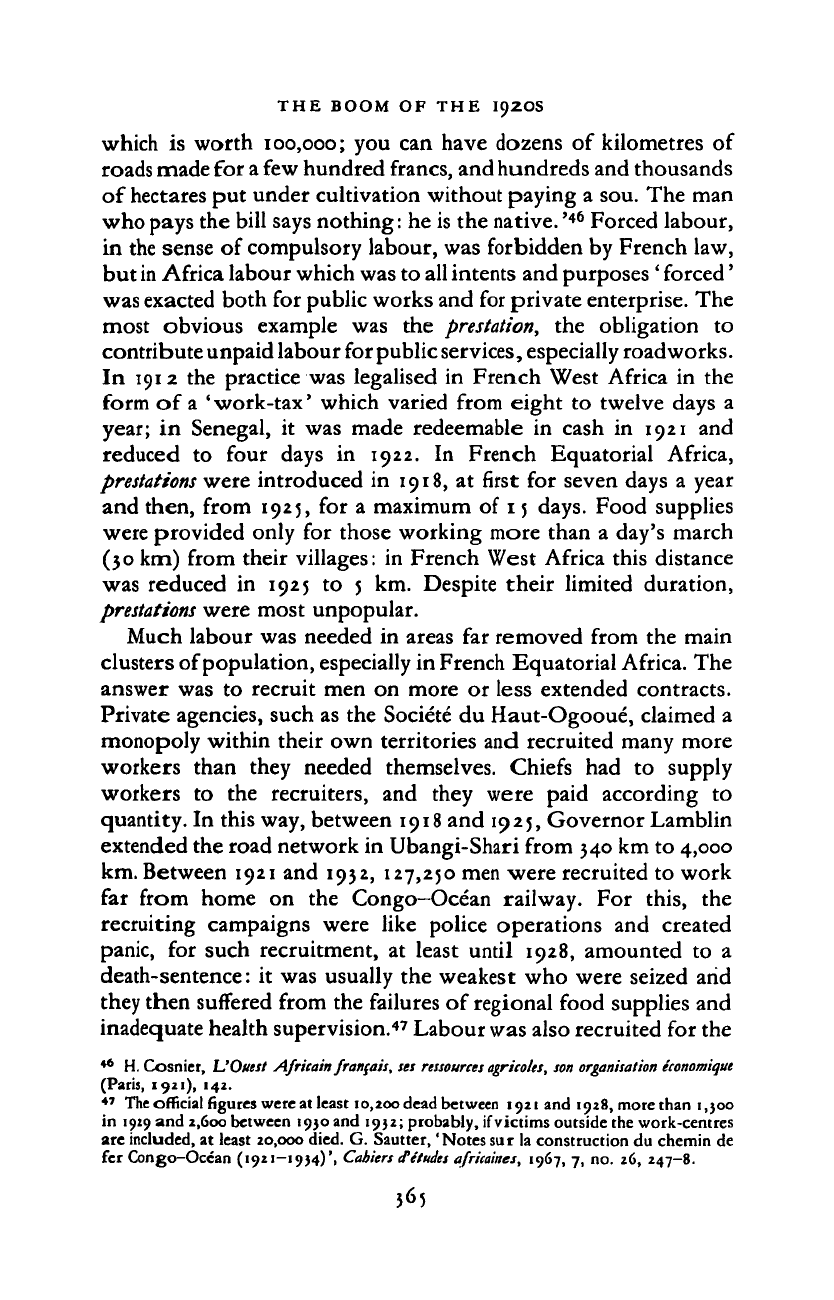
THE BOOM OF THE 1920S
which
is
worth 100,000; you can have dozens
of
kilometres
of
roads made for
a
few hundred francs, and hundreds and thousands
of hectares put under cultivation without paying a sou. The man
who pays the bill says nothing: he is the
native.
'
46
Forced labour,
in the sense of compulsory labour, was forbidden by French law,
but
in
Africa labour which was to
all
intents and purposes ' forced'
was exacted both for public works and for private enterprise. The
most obvious example
was the
prestation,
the
obligation
to
contribute unpaid labour for public services, especially roadworks.
In 1912 the practice was legalised in French West Africa
in
the
form
of
a
'
work-tax' which varied from eight
to
twelve days
a
year;
in
Senegal,
it
was made redeemable
in
cash
in
1921
and
reduced
to
four days
in
1922.
In
French Equatorial Africa,
prestations
were introduced in 1918,
at
first for seven days
a
year
and then, from 1925, for
a
maximum
of
15 days. Food supplies
were provided only for those working more than
a
day's march
(30 km) from their villages: in French West Africa this distance
was reduced
in
1925
to
5 km. Despite their limited duration,
prestations
were most unpopular.
Much labour was needed in areas far removed from the main
clusters of population, especially in French Equatorial Africa. The
answer was
to
recruit men on more or less extended contracts.
Private agencies, such as the Societe du Haut-Ogooue, claimed
a
monopoly within their own territories and recruited many more
workers than they needed themselves. Chiefs
had to
supply
workers
to the
recruiters,
and
they were paid according
to
quantity. In this way, between 1918 and 1925, Governor Lamblin
extended the road network in Ubangi-Shari from 340 km to 4,000
km. Between 1921 and 1932, 127,250 men were recruited to work
far from home
on the
Congo-Ocean railway.
For
this,
the
recruiting campaigns were like police operations
and
created
panic,
for
such recruitment,
at
least until 1928, amounted
to a
death-sentence:
it
was usually the weakest who were seized arid
they then suffered from the failures of regional food supplies and
inadequate health supervision.
47
Labour was also recruited for the
46
H. Cosniet, L'Outst Africainfratifais, ses resources
agricoles,
son organisation iconomique
(Paris, 1921), 142.
47
The official figures were at least 10,200 dead between 1921 and 1928, more than 1,300
in 1929 and 2,600 between 1930 and 1932; probably, ifvictims outside the work-centres
are included, at least 20,000 died.
G.
Sautter, 'Notes sur la construction du chemin
de
fer Congo-Ocean (1921-1934)', Cabiers <T
etudes
africa'mes,
1967,
7,
no. 26, 247-8.
365
Cambridge Histories Online © Cambridge University Press, 2008
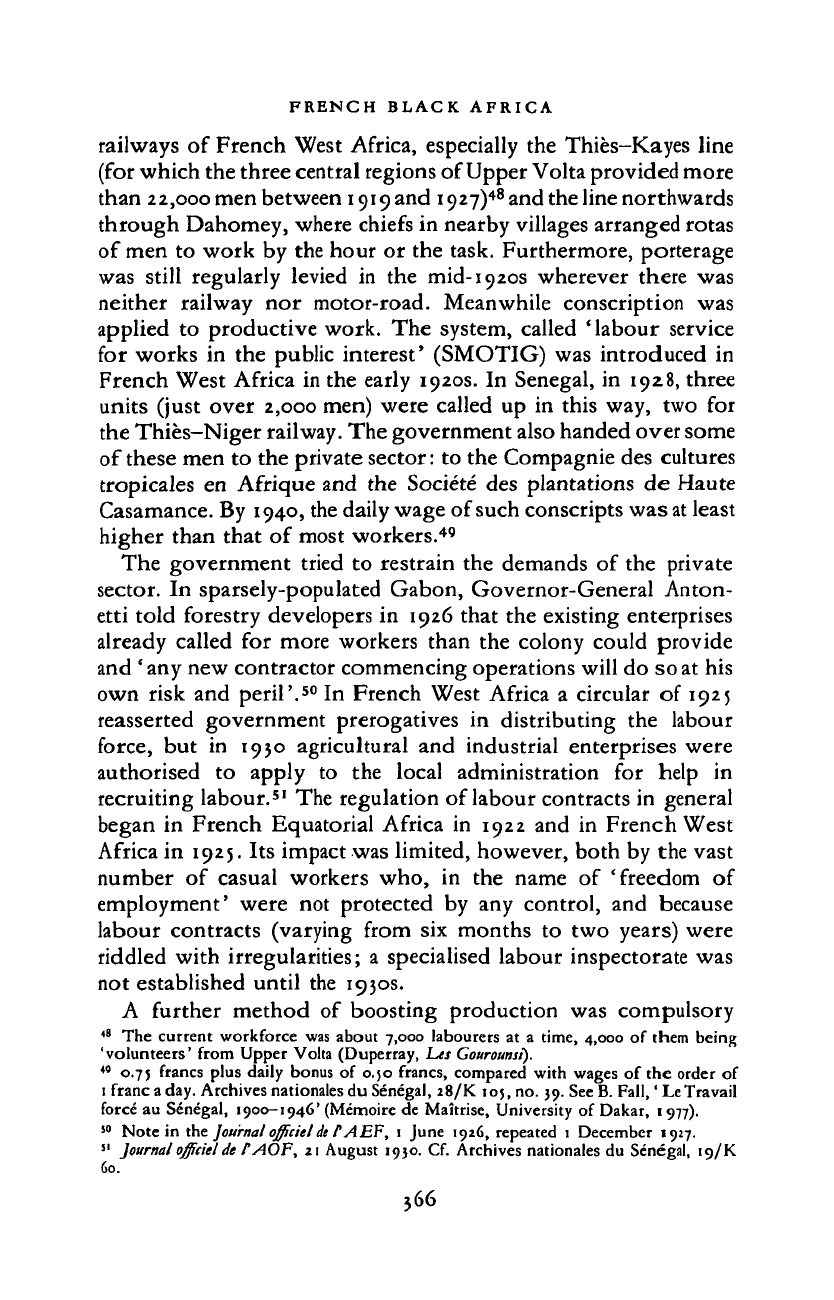
FRENCH BLACK AFRICA
railways
of
French West Africa, especially the Thies-Kayes line
(for which the three central regions of Upper Volta provided more
than 22,000 men between
1919
and
1927)
48
and the line northwards
through Dahomey, where chiefs in nearby villages arranged rotas
of men
to
work by the hour
or
the task. Furthermore, porterage
was still regularly levied
in the
mid-1920s wherever there was
neither railway
nor
motor-road. Meanwhile conscription
was
applied
to
productive work. The system, called ' labour service
for works
in
the public interest' (SMOTIG) was introduced
in
French West Africa in the early 1920s.
In
Senegal,
in
1928, three
units (just over 2,000 men) were called
up in
this way, two
for
the Thies-Niger railway. The government also handed over some
of these men to the private sector: to the Compagnie des cultures
tropicales
en
Afrique and
the
Societe des plantations
de
Haute
Casamance. By 1940, the daily wage of such conscripts was
at
least
higher than that
of
most workers.
49
The government tried
to
restrain the demands
of
the private
sector.
In
sparsely-populated Gabon, Governor-General Anton-
etti told forestry developers
in
1926 that the existing enterprises
already called
for
more workers than the colony could provide
and ' any new contractor commencing operations will do so at his
own risk and peril'.
50
In French West Africa
a
circular
of
1925
reasserted government prerogatives
in
distributing
the
labour
force,
but in
1930 agricultural
and
industrial enterprises were
authorised
to
apply
to the
local administration
for
help
in
recruiting labour.
51
The regulation of labour contracts in general
began
in
French Equatorial Africa
in
1922 and
in
French West
Africa in 1925. Its impact was limited, however, both by the vast
number
of
casual workers who,
in the
name
of
'freedom
of
employment' were
not
protected
by any
control,
and
because
labour contracts (varying from
six
months
to
two years) were
riddled with irregularities;
a
specialised labour inspectorate was
not established until the 1930s.
A further method
of
boosting production
was
compulsory
<
8
The current workforce was about 7,000 labourers
at a
time, 4,000
of
them being
'volunteers' from Upper Volta (Duperray,
LAS
Gourounsi).
49
0.75 francs plus daily bonus
of
0.50 francs, compared with wages
of
the order
of
1
franc a day. Archives nationales du Senegal, 28/K 105, no. 39. See B. Fall,' Le Travail
force
au
Senegal, 1900-1946' (Memoire de Maitrise, University
of
Dakar, 1977).
s0
Note
in
the journal
officielde
PAEF, 1 June 1926, repeated 1 December 1927.
sl
Journal officiel de
FAOF, 21 August 1930.
Cf.
Archives nationales du Senegal, 19/K
60.
366
Cambridge Histories Online © Cambridge University Press, 2008
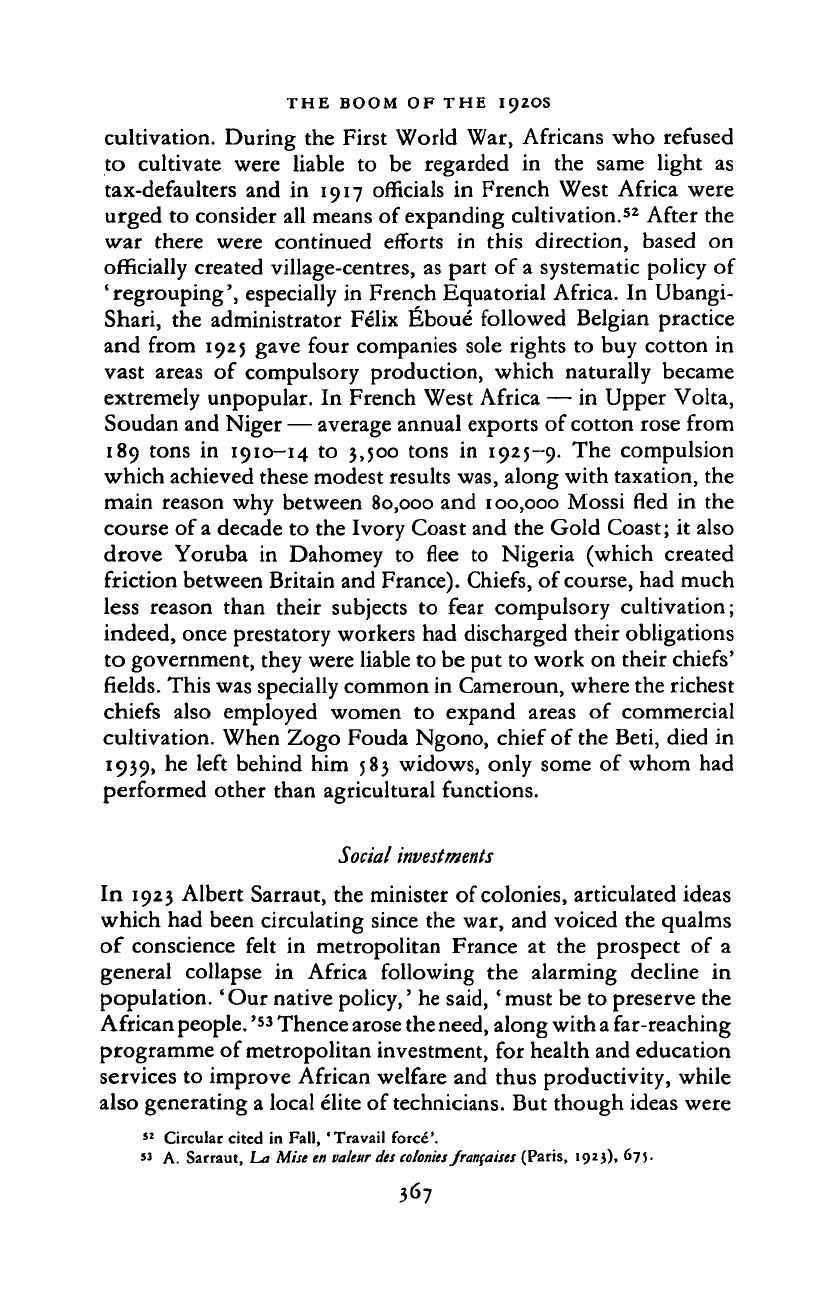
THE BOOM OF THE 1920S
cultivation. During the First World War, Africans who refused
to cultivate were liable
to be
regarded
in the
same light
as
tax-defaulters and
in
1917 officials
in
French West Africa were
urged to consider all means of expanding cultivation.
52
After the
war there were continued efforts
in
this direction, based
on
officially created village-centres, as part of a systematic policy of
'regrouping', especially in French Equatorial Africa.
In
Ubangi-
Shari, the administrator Felix Eboue followed Belgian practice
and from 1925 gave four companies sole rights to buy cotton in
vast areas
of
compulsory production, which naturally became
extremely unpopular. In French West Africa — in Upper Volta,
Soudan and Niger — average annual exports of cotton rose from
189 tons
in
1910—14
to
3,500 tons
in
1925—9. The compulsion
which achieved these modest results was, along with taxation, the
main reason why between 80,000 and 100,000 Mossi fled
in
the
course of
a
decade to the Ivory Coast and the Gold Coast;
it
also
drove Yoruba
in
Dahomey
to
flee
to
Nigeria (which created
friction between Britain and France). Chiefs, of
course,
had much
less reason than their subjects
to
fear compulsory cultivation;
indeed, once prestatory workers had discharged their obligations
to government, they were liable to be put to work on their chiefs'
fields.
This was specially common in Cameroun, where the richest
chiefs also employed women
to
expand areas
of
commercial
cultivation. When Zogo Fouda Ngono, chief of the Beti, died in
1939,
he left behind him 583 widows, only some
of
whom had
performed other than agricultural functions.
Social investments
In 1923 Albert Sarraut, the minister of colonies, articulated ideas
which had been circulating since the war, and voiced the qualms
of conscience felt
in
metropolitan France
at the
prospect
of a
general collapse
in
Africa following
the
alarming decline
in
population. ' Our native policy,' he said, ' must be to preserve the
African
people.
'
53
Thence arose the need, along with
a
far-reaching
programme of metropolitan investment, for health and education
services to improve African welfare and thus productivity, while
also generating a local elite of
technicians.
But though ideas were
52
Circular cited
in
Fall, 'Travail force'.
51
A.
Sarraut,
La
Mist en
valeur
det colonies franfaises (Paris, 1923), 675.
367
Cambridge Histories Online © Cambridge University Press, 2008
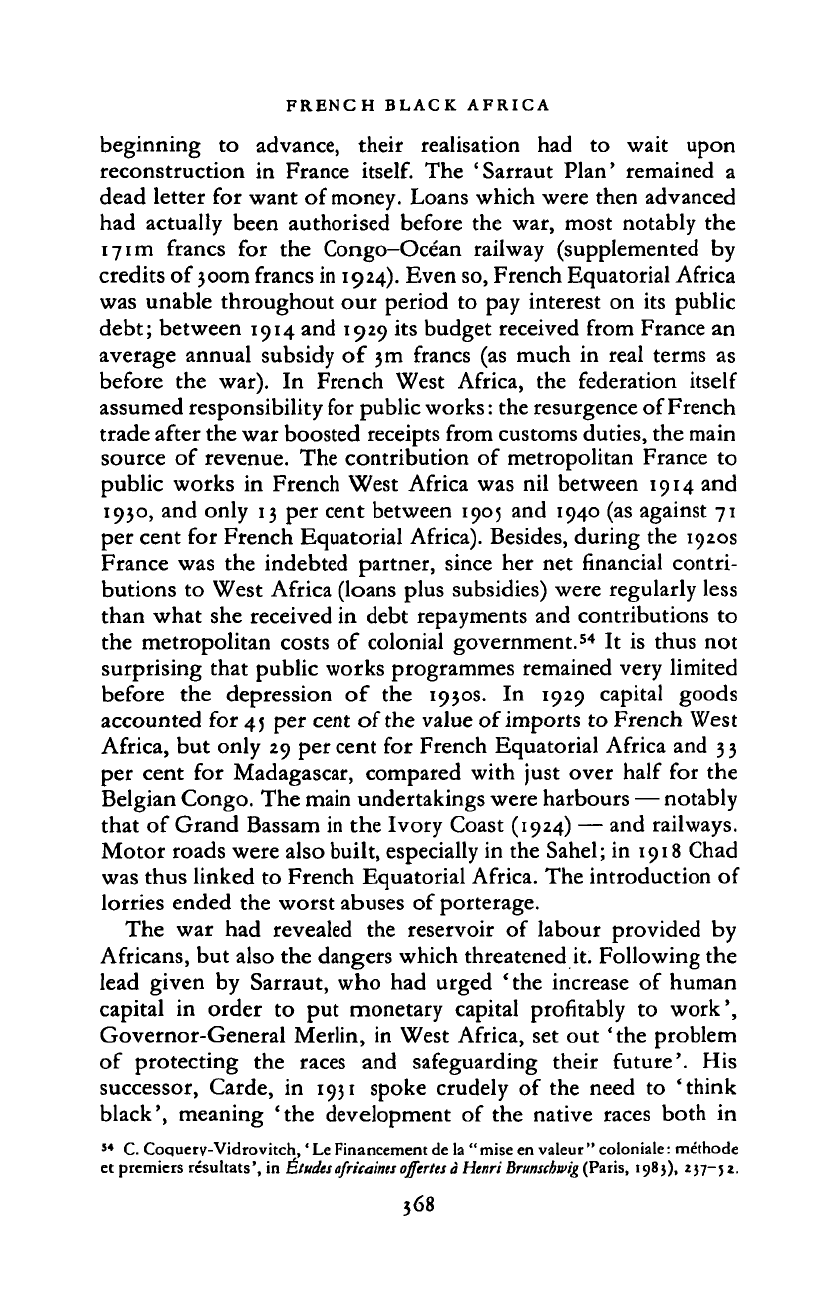
FRENCH BLACK AFRICA
beginning to advance, their realisation had to wait upon
reconstruction in France
itself.
The 'Sarraut Plan' remained a
dead letter for want of
money.
Loans which were then advanced
had actually been authorised before the war, most notably the
171m francs for the Congo—Ocean railway (supplemented by
credits of 300m francs in 1924). Even so, French Equatorial Africa
was unable throughout our period to pay interest on its public
debt; between 1914 and 1929 its budget received from France an
average annual subsidy of 3 m francs (as much in real terms as
before the war). In French West Africa, the federation itself
assumed responsibility for public works: the resurgence of French
trade after the war boosted receipts from customs duties, the main
source of revenue. The contribution of metropolitan France to
public works in French West Africa was nil between 1914 and
1930,
and only 13 per cent between 1905 and 1940 (as against 71
per cent for French Equatorial Africa). Besides, during the 1920s
France was the indebted partner, since her net financial contri-
butions to West Africa (loans plus subsidies) were regularly less
than what she received in debt repayments and contributions to
the metropolitan costs of colonial government.
54
It is thus not
surprising that public works programmes remained very limited
before the depression of the 1930s. In 1929 capital goods
accounted for 45 per cent of the value of imports to French West
Africa, but only 29 per cent for French Equatorial Africa and
3 3
per cent for Madagascar, compared with just over half for the
Belgian Congo. The main undertakings were harbours — notably
that of Grand Bassam in the Ivory Coast (1924) — and railways.
Motor roads were also built, especially in the Sahel; in 1918 Chad
was thus linked to French Equatorial Africa. The introduction of
lorries ended the worst abuses of porterage.
The war had revealed the reservoir of labour provided by
Africans, but also the dangers which threatened it. Following the
lead given by Sarraut, who had urged 'the increase of human
capital in order to put monetary capital profitably to work',
Governor-General Merlin, in West Africa, set out 'the problem
of protecting the races and safeguarding their future'. His
successor, Carde, in 1931 spoke crudely of the need to 'think
black', meaning 'the development of the native races both in
54
C. Coquetv-Vidrovitch,' Le Financement de la "mise en valeur
"
coloniale: methode
et premiers resultats', in Etudesafricaintsoffertesa Henri
Brunschwig
(Paris, 1983), 257-52.
368
Cambridge Histories Online © Cambridge University Press, 2008
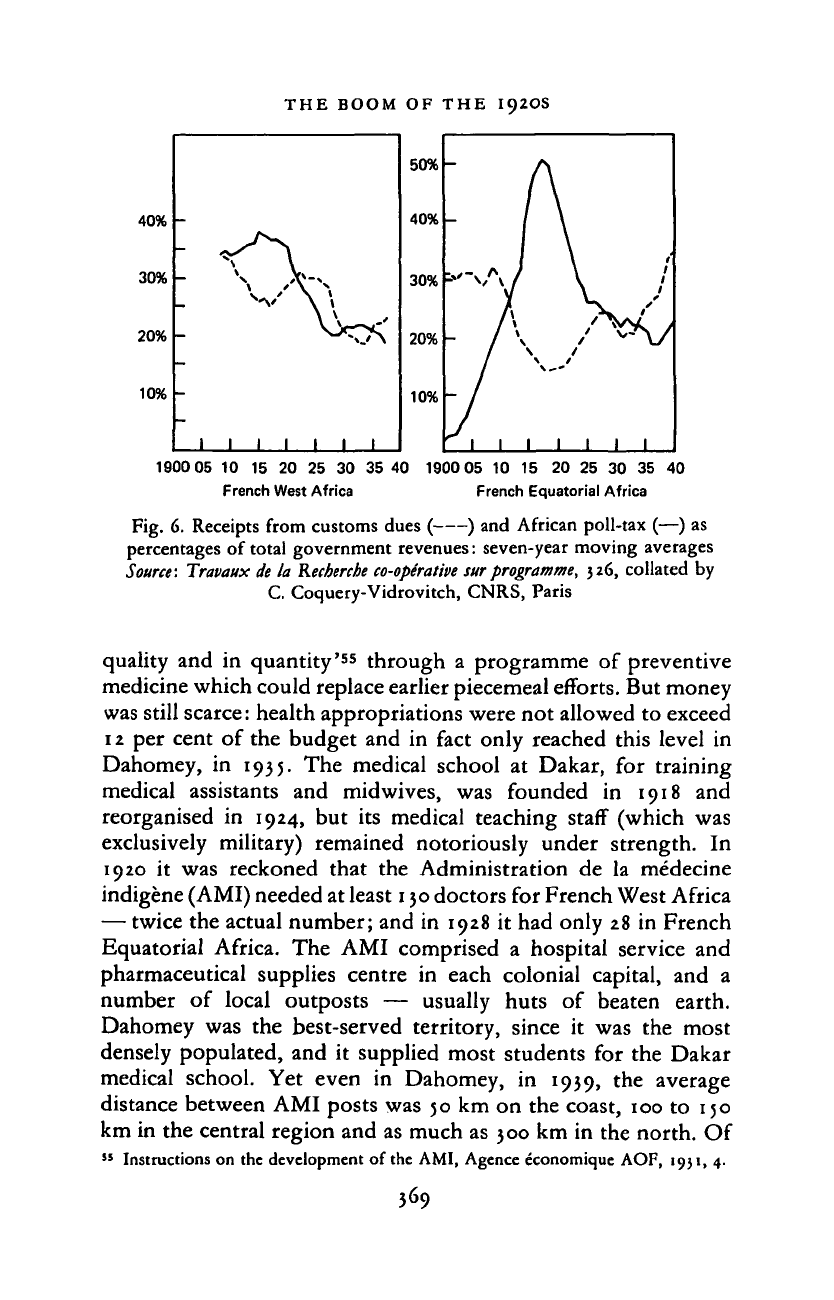
10%
-
THE BOOM OF THE I92OS
50%
-
40%
-
30%
20%
-
10%
-
1900 05 10 15 20 25 30 35 40
French West Africa
1900 05 10 15 20 25 30 35 40
French Equatorial Africa
Fig. 6. Receipts from customs dues ( ) and African poll-tax (—) as
percentages of total government revenues: seven-year moving averages
Source: Travaux de la
Recherche co-operative
sur programme, 326, collated by
C. Coquery-Vidrovitch, CNRS, Paris
quality and in quantity'
55
through a programme of preventive
medicine which could replace earlier piecemeal efforts. But money
was still scarce: health appropriations were not allowed to exceed
12 per cent of the budget and in fact only reached this level in
Dahomey, in 1935. The medical school at Dakar, for training
medical assistants and midwives, was founded in 1918 and
reorganised in 1924, but its medical teaching staff (which was
exclusively military) remained notoriously under strength. In
1920 it was reckoned that the Administration de la medecine
indigene (AMI) needed at least
130
doctors for French West Africa
— twice the actual number; and in 1928 it had only 28 in French
Equatorial Africa. The AMI comprised a hospital service and
pharmaceutical supplies centre in each colonial capital, and a
number of local outposts — usually huts of beaten earth.
Dahomey was the best-served territory, since it was the most
densely populated, and it supplied most students for the Dakar
medical school. Yet even in Dahomey, in 1939, the average
distance between AMI posts was 50 km on the coast, 100 to 150
km in the central region and as much as 300 km in the north. Of
55
Instructions on the development of the AMI, Agence economique AOF, 1951, 4.
369
Cambridge Histories Online © Cambridge University Press, 2008
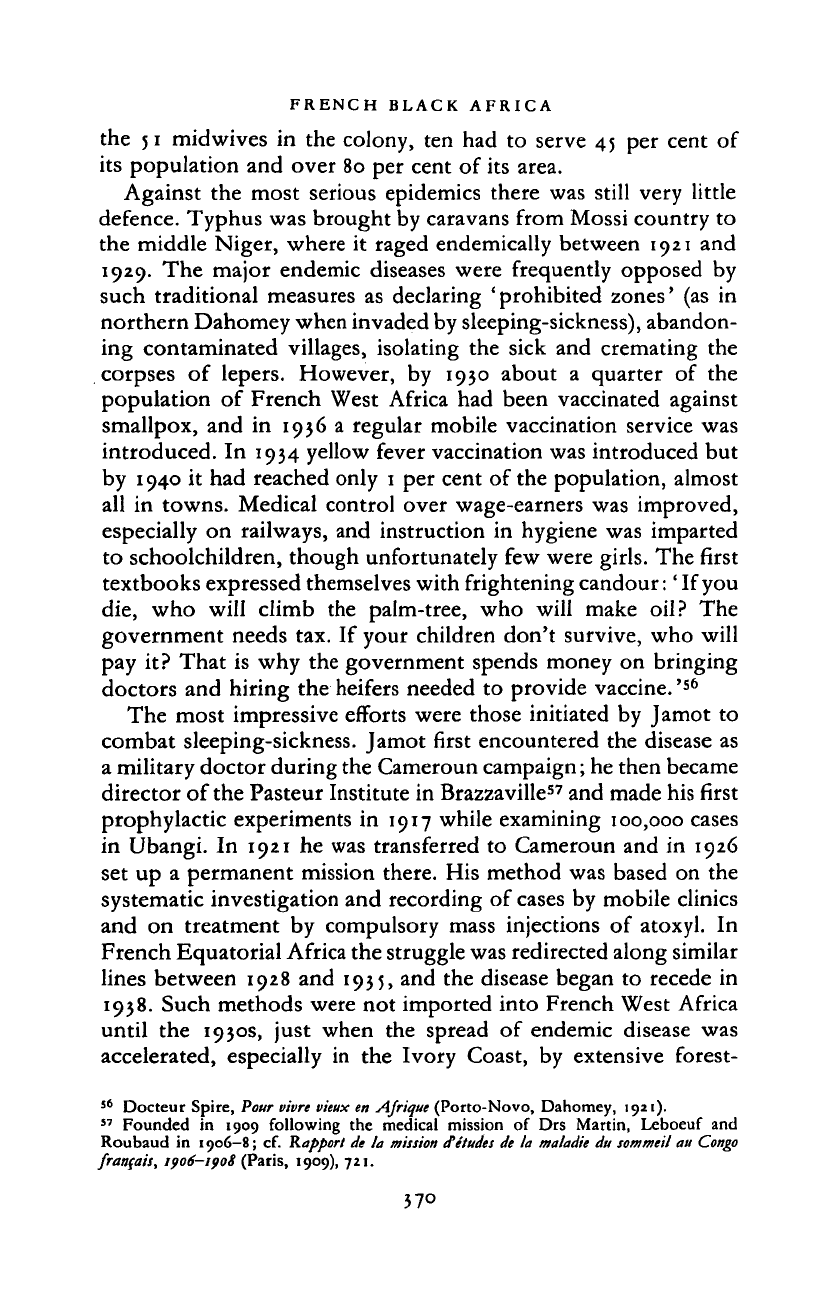
FRENCH BLACK AFRICA
the 51 mid wives
in
the colony, ten had
to
serve 45 per cent
of
its population and over 80 per cent of its area.
Against the most serious epidemics there was still very little
defence. Typhus was brought by caravans from Mossi country to
the middle Niger, where
it
raged endemically between 1921 and
1929.
The major endemic diseases were frequently opposed
by
such traditional measures as declaring 'prohibited zones' (as
in
northern Dahomey when invaded by sleeping-sickness), abandon-
ing contaminated villages, isolating the sick and cremating the
corpses
of
lepers. However,
by
1930 about
a
quarter
of the
population
of
French West Africa had been vaccinated against
smallpox, and
in
1936 a regular mobile vaccination service was
introduced. In 1934 yellow fever vaccination was introduced but
by 1940
it
had reached only
1
per cent of the population, almost
all
in
towns. Medical control over wage-earners was improved,
especially on railways, and instruction
in
hygiene was imparted
to schoolchildren, though unfortunately few were girls. The first
textbooks expressed themselves with frightening candour:' If you
die,
who will climb
the
palm-tree, who will make oil? The
government needs tax.
If
your children don't survive, who will
pay it? That is why the government spends money on bringing
doctors and hiring the heifers needed to provide vaccine. '
s6
The most impressive efforts were those initiated by Jamot
to
combat sleeping-sickness. Jamot first encountered the disease as
a military doctor during the Cameroun campaign; he then became
director of the Pasteur Institute in Brazzaville
57
and made his first
prophylactic experiments
in
1917 while examining 100,000 cases
in Ubangi.
In
1921 he was transferred to Cameroun and in 1926
set up
a
permanent mission there. His method was based on the
systematic investigation and recording of cases by mobile clinics
and
on
treatment
by
compulsory mass injections
of
atoxyl.
In
French Equatorial Africa the struggle was redirected along similar
lines between 1928 and 1935, and the disease began to recede in
1938.
Such methods were not imported into French West Africa
until
the
1930s, just when
the
spread
of
endemic disease was
accelerated, especially
in
the Ivory Coast,
by
extensive forest-
56
Docteur Spire, Pour vivre vieux en AJrique (Porto-Novo, Dahomey, 1921).
57
Founded
in
1909 following
the
medical mission
of
Drs Martin, Leboeuf and
Roubaud
in
1906—8;
cf.
Rapport de
la
mission
a"etudes
de la maladie du sommeil au Congo
franfais, if
06—1908
(Paris, 1909), 721.
37°
Cambridge Histories Online © Cambridge University Press, 2008
